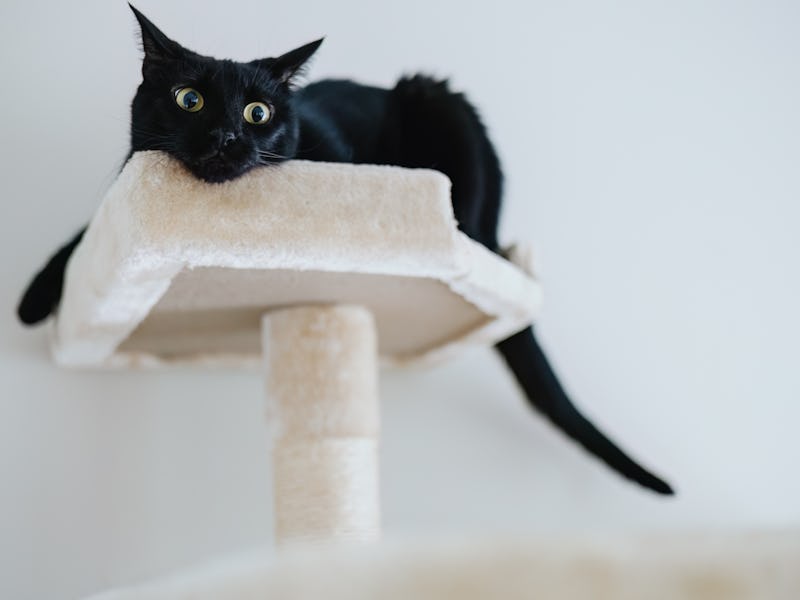Is My Cat Bored? Here's What Animal Boredom Actually Looks Like
Like people, animals can feel apathy and malaise.

When humans are bored, we might scroll our phones or go down an internet rabbit hole. But how do you know if your pet is bored? Cats and dogs sleep 15 to 20 hours every day normally; how can you tell the difference between sleeping a healthy amount and sleeping out of boredom (another favorite human pastime)?
Two veterinarians describe what animal boredom might look like, what happens if it goes unaddressed, and how to keep our favorite critters happy and curious.
Does my pet get bored?
Like people, animals can feel boredom. While a pet may be doted on day and night, never having to worry again about scrounging for food or finding a decent place to sleep, even the good life requires stimulation.
“Providing mental and physical enrichment is very important not only to prevent boredom and frustration, but also to help satisfy a dog or cat's normal or species-specific behaviors,” Rachel Malamed, a behavioral veterinarian in Los Angeles, writes to Inverse. Pets are still hardwired to chew, dig, climb, scratch, and more. If they’re not presented with ample opportunities to satisfy those innate needs, “they may find other things to chew, dig, scratch or climb on such as your shoes, garden, favorite couch or countertops, respectively,” Malamed writes.
How can I tell if my pet is bored?
Cats are going to do cat things and dogs are going to do dog things with whatever resources they have at hand — uh, paw — but sometimes undesirable behavior can manifest in more upsetting ways. Unrelieved boredom may grow into anxiety, Carly Fox, a senior veterinarian at the Schwarzman Animal Medical Center in New York City, writes to Inverse. Anxiety can lead to self-mutilation, such as excessive licking and biting as well as fur mowing or the cat’s act of licking off all its fur, usually on the belly, until it’s bald.
While boredom-induced anxiety can produce short-term health issues, it also takes a toll in the long run. For cats, “stress plays a role in many disease processes,” Malamed writes to Inverse, such as feline idiopathic cystitis (FIC), which causes bladder inflammation. She points to a 2006 study published in the Journal of Feline Medicine and Surgery that demonstrates how environmental enrichment for cats decreases stress response triggers that are associated with FIC’s lower urinary tract symptoms.
Sleep can be another telltale sign of boredom, though some investigation is required. “Animals’ sleep patterns differ due to their routine, age, and underlying health concerns,” Fox writes to Inverse. These changing patterns make sleep a less concrete measure of boredom, but she advises that you take your little friend to the vet for an exam and bloodwork if you’re concerned. That way, you can rule out systemic disease.
How can I alleviate boredom?
Easy-to-find tools like scratching posts and chew toys relieve some of an animal’s innate behaviors. A suite of toys are designed to keep pets engaged mentally. Puzzle balls and boxes require pets to use tenacity and wit to unlock mouthwatering treats. Malamed also underscores the importance of olfactory stimulation for dogs. Fox mentions some toys that are ideal for this purpose, like hollow chew toys that can hold frozen peanut butter and other redolent hard-to-get goodies. Multiple options also improve your pet’s ability to cope with stressors, Malamed writes. For example, she recommends playdates with familiar dogs in a controlled environment.
Screen time, it turns out, works well for pets too. Bird livestreams can entertain (and pleasantly confuse) cats. Leaving on music might relax your pet and dampen any outside noise.
You might brush off your ever-begging pet who seems to require constant attention, but Fox offers guidance on the minimum. “Most dogs require about 30 min to 2 hours of exercise a day,” she writes. “For cats, aim for about 10-15 minutes of exercise/play daily.”
Editor’s Note: A previous version of this story recommended dog parks as a way to alleviate boredom. However, veterinarian Rachel Malamed recommends playdates with familiar dogs. We are glad to correct the error.